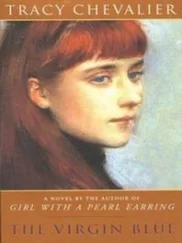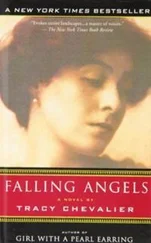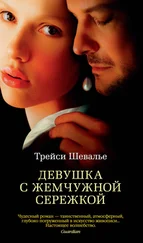Трейси Шевалье - At the Edge of the Orchard
Здесь есть возможность читать онлайн «Трейси Шевалье - At the Edge of the Orchard» весь текст электронной книги совершенно бесплатно (целиком полную версию без сокращений). В некоторых случаях можно слушать аудио, скачать через торрент в формате fb2 и присутствует краткое содержание. Год выпуска: 2016, Жанр: Современная проза, на английском языке. Описание произведения, (предисловие) а так же отзывы посетителей доступны на портале библиотеки ЛибКат.
- Название:At the Edge of the Orchard
- Автор:
- Жанр:
- Год:2016
- ISBN:нет данных
- Рейтинг книги:3 / 5. Голосов: 1
-
Избранное:Добавить в избранное
- Отзывы:
-
Ваша оценка:
- 60
- 1
- 2
- 3
- 4
- 5
At the Edge of the Orchard: краткое содержание, описание и аннотация
Предлагаем к чтению аннотацию, описание, краткое содержание или предисловие (зависит от того, что написал сам автор книги «At the Edge of the Orchard»). Если вы не нашли необходимую информацию о книге — напишите в комментариях, мы постараемся отыскать её.
Fifteen years later their youngest son, Robert, is drifting through gold rush California. When he finds steady work for a plant collector, peace seems finally to be within reach. But the past is never really past, and one day Robert is forced to confront the brutal reason he left behind everything he loved.
At the Edge of the Orchard — читать онлайн бесплатно полную книгу (весь текст) целиком
Ниже представлен текст книги, разбитый по страницам. Система сохранения места последней прочитанной страницы, позволяет с удобством читать онлайн бесплатно книгу «At the Edge of the Orchard», без необходимости каждый раз заново искать на чём Вы остановились. Поставьте закладку, и сможете в любой момент перейти на страницу, на которой закончили чтение.
Интервал:
Закладка:
“ Your needs. You’re the one with the sweet tooth.”
James could have reminded Sadie that it was she who put sugar in her tea, and noticed when they were running low and nagged James to go to Perrysburg for more. Instead he doggedly set out the numbers as he’d done several times over the last week when he’d announced his intention to graft more trees this year. “That’ll make thirteen eaters and twenty-five spitters. Add to that fifteen of John Chapman’s seedlings he’s bringing us next week, and that takes us to fifty-three trees, three more than we need to satisfy the law. Thirteen eaters and forty spitters, all producing in a few years. Eventually we’ll have more spitters than we do now for cider. And we can always press eaters if we have to.” Secretly he vowed never to waste eaters on making cider.
Slumped at the table, her daughter moving lightly around her as she prepared supper, Sadie watched her husband through her eyebrows. Her eyes were red. “That’s your latest apple plan, is it? You gonna go straight past the magic number fifty to fifty-three?”
James knew he should not have used so many numbers to explain what he wanted to do. They bothered Sadie like wasps, especially when she had applejack in her. “Numbers are a Yankee invention, and we ain’t in Connecticut now,” she often reminded him. “Ohioans don’t care a spit about numbers. I don’t want to know exactly how many mouths I got to feed-I jest want to put food on the table.”
But James could not help himself: it comforted him to count his trees, to mull over the number, add another Golden Pippin, remove a mongrel spitter that was a result of one of John Chapman’s visits. Solid numbers held back the woods surrounding their claim, so dense you could never count all the trees. Numbers made you feel in charge.
Today Sadie’s response to the numbers he laid out in his argument was even blunter. “Fuck your numbers,” she said. “You ain’t never gonna reach fifty, much less fifty-three.”
Disrespect for numbers: that was what made James slap her-though he wouldn’t have if she’d still held the knife.
She responded by going for him with her fists, and got in a jab to the side of his head before he wrestled her back into her seat and slapped her again. At least she didn’t manage to catch an eye, as she had done once; his neighbors enjoyed teasing James about the shiner his wife had given him. Buckeye, they called it, after the chestnuts so common in Ohio. Lots of wives sported buckeyes; not so many husbands.
The second slap split Sadie’s lip. She seemed puzzled by the sight of her own blood, and remained seated, the bright drops spotting her dress like fallen berries.
“Get your mother cleaned up, and call me when supper’s ready,” James said to Martha, who set down the knife and went to get a cloth. Martha was his favorite, being gentle and never challenging him or seeming to laugh at him as some of his other children did. He feared for her each August when the swamp fever arrived. Almost every year one of his children was picked off, to join the row of graves marked with wooden crosses in a slightly higher spot in the woods not far from the cabin. With each grave he’d had to clear maples and ash to make space to dig. He’d learned to do this in July, before anyone died, so that the body did not have to wait for him to wrestle with the trees’ extensive roots. Best to get the wrestling out of the way when he had the time.

I was used to his slaps. Didnt bother me none. Fightin over apples was jest what we did.
Funny, I didnt think much about apples fore we came to the Black Swamp. When I was growin up we had an orchard like everybody else but I didnt pay it no attention cept when the blossom was out in May. Then Id go and lie there smellin some sweet perfume and listenin to the bees hum so happy cause they had flowers to play with. That was where James and I lay our first time together. I shouldve known then he wasnt for me. He was so busy inspectin my familys trees and askin how old each was-like I would know-and what the fruit was like (Juicy like me, I said) that finally I had to unbutton my dress myself. That shut him up a while.
I never was a good picker. Ma said I was too quick, let too many drop and pulled off the stems of the rest. I was quick cause I wanted to get it done. I used two hands to twist and pull two apples and then the third would drop and bruise and wed have to gather all the bruised ones separate and cook em up right away into apple butter. Beginnin of each season Ma and Pa would get me pickin till they remembered about that third apple always droppin. So they put me on to gatherin the windfalls that were bruised and damaged from fallin off the tree. Windfalls werent all bad apples. They could still be stewed or made into cider. Or theyd have me cookin or slicin rings to dry. I liked the slicin. If you cut an apple across the core rather than along it you get the seeds makin flowers or stars in the middle of the circle. I told John Chapman once and he smiled at me. Gods ways, he said. Youre smart to see that, Sadie. Only time anyone ever called me smart.
James wouldnt let me touch the apples on his trees either. His precious thirty-eight trees. (Oh I knew how many he had. He thought I wasnt listenin when he was rattlin through his numbers but drunk or not I heard him cause he repeated himself so much.) When we was married back in Connecticut he learned real quick how many apples I spoiled. So in the Black Swamp he got some of the children to pick em-Martha and Robert and Sal. He wouldnt let Caleb or Nathan pick, said we were all too rough. He was like a little old woman with his trees. Drove me crazy.

James headed out behind the cabin, past the garden they’d begun turning over now the ground was no longer frozen, and out to the orchard. Upon settling in the Black Swamp, the first thing the Goodenoughs had done after building a rough cabin close to the Portage River was to clear land for the orchard so as to plant John Chapman’s apple saplings. Every oak, every hickory, every elm he cut down was an agony of effort. It was hard enough to chop up and haul the trunk and branches to set aside for firewood, or for making bed frames or chairs or wheels or coffins. But extracting the stumps and roots almost killed him each time he hacked and dug and pulled and ground. Prying out a stump reminded him of how deeply a tree clung to the ground, how tenacious a hold it had on a place. Though he was not a sentimental man-he did not cry when his children died, he simply dug the graves and buried them-James was silent each time he killed a tree, thinking of its time spent in that spot. He never did this with the animals he hunted-they were food, and transient, passing through this world and out again, as people did. But trees felt permanent-until you had to cut them down.
He stood in the melting March dusk and surveyed his orchard-five rows of trees, with a small nursery of seedlings in one corner. It was rare to see space around individual trees in the Black Sw & normally there was either open water or dense woods. The Goodenough orchard was not spectacular, but it was proof to James that he could tame one small patch of land, make the trees do what he wanted. Beyond them, wilderness waited in the tangled undergrowth and sudden bogs; you had to take each step with care or find yourself up to your thighs in black stagnant water. After going into the swamp, to hunt or cut wood or visit a neighbor, James was always relieved to step back into the safe order of his orchard.
Now he counted his apple trees, even though he already knew that he had thirty-eight. He had expected the requirement for settling in Ohio of fifty viable fruit trees in three years would be easy to achieve, but he had been assuming apple trees would grow in the swamp as they had done on his father’s farm in Connecticut, where the ground was fertile and well drained. But swampland was different: waterlogged and brackish, it rotted roots, encouraged mildew, attracted blackfly. It was surprising that apple trees could survive there at all. There were plenty of other trees: maple was abundant, also ash and elm and hickory and several kinds of oak. But apple trees needed light and dry soil or they could easily not produce fruit. And if they did not produce, the Goodenoughs must go without. The Black Swamp was not like Connecticut, where if your trees had blight or scab or mildew and grew no apples, you could barter or buy from neighbors. Their neighbors here were few and scattered-only the Days two miles away had been there almost as long, though lately others had begun to settle nearby-and had no apples to spare.
Читать дальшеИнтервал:
Закладка:
Похожие книги на «At the Edge of the Orchard»
Представляем Вашему вниманию похожие книги на «At the Edge of the Orchard» списком для выбора. Мы отобрали схожую по названию и смыслу литературу в надежде предоставить читателям больше вариантов отыскать новые, интересные, ещё непрочитанные произведения.
Обсуждение, отзывы о книге «At the Edge of the Orchard» и просто собственные мнения читателей. Оставьте ваши комментарии, напишите, что Вы думаете о произведении, его смысле или главных героях. Укажите что конкретно понравилось, а что нет, и почему Вы так считаете.
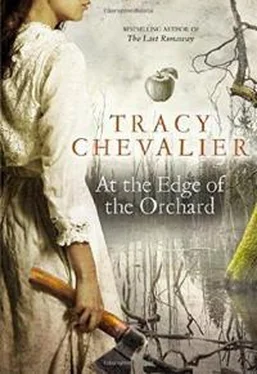

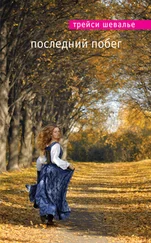

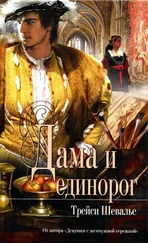
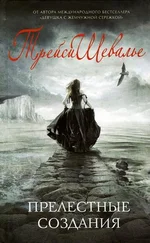
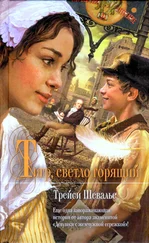
![Трейси Шевалье - Тонкая нить [Литрес]](/books/386177/trejsi-shevale-tonkaya-nit-litres-thumb.webp)
